Feb. 4 to Feb. 10
As a female, Chuang Shu-chi (莊淑旂) was not supposed to follow her father’s footsteps in practicing traditional Chinese medicine.
Her father desperately wanted a son, but her mother was unable to have any more children after a miscarriage. The family later adopted two boys, and Chuang was deeply affected when she heard her father lament that she would only grow up to be part of someone else’s family.
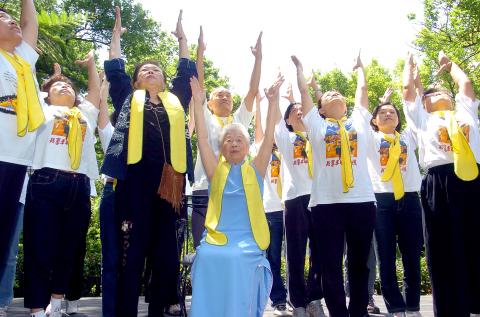
Photo: Lu Chun-wei, Taipei Times
Chuang says in her biography by historian Hsu Hsueh-chi (許雪姬) that in order to prove that she could help her father, she started secretly studying medicine and learning folk remedies from visitors. So when her father’s assistant suddenly died, a 12-year-old Chuang knew exactly what to do.
That night, Chuang gathered her stepbrothers and correctly prepared the ingredients needed for her father’s tasks the next day. Her surprised father pulled her out of school and started training her at the shop, launching the career of Taiwan’s first licensed female Chinese medicine doctor.
Chuang practiced in Taiwan for only a few years before she fled to Japan, where she gained fame becoming a medical consultant to the imperial family. She returned to Taiwan in 1988 and by the time she died on Feb. 4, 2015, she had gained fame as the “godmother of cancer prevention” and known for tirelessly promoting her “Cancer Prevention Universal Exercise” (防癌宇宙操), a six-minute-per-day routine that she says helps empty stomach gas and promotes circulation and natural energy absorption.
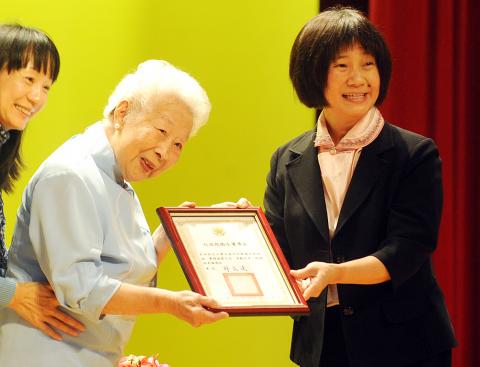
Photo: Tsung Chang-chin, Taipei Times
‘LADY DOCTOR’
It was rare for women to work at medicine shops, but Chuang’s appearance unexpectedly gave the family business a huge boost.
“I was not a beauty, but many believed that if they took medicine prepared by an unmarried girl, their symptoms would alleviate quicker … People even came back to present me with red envelopes and gifts after they got better. The news of a doctor’s daughter who helped prepare medicine quickly spread.”
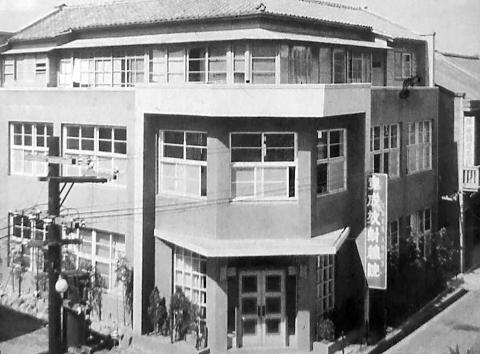
Photo courtesy of Wikimedia Commons
Chuang’s skills greatly improved under her father’s strict tutelage. When she was about 14, one of her nephews fell ill with fever and pneumonia. The local pediatrician pronounced him incurable and told the family to leave him to die, but Chuang managed to nurse him back to health. Armed with newfound confidence, Chuang writes that she managed to save two more children before she turned 16.
Chuang’s father died of rectal cancer when she was 19. She had gotten married a year previously — World War II was intensifying and her parents hastily found her a husband to avoid being forced by the Japanese into sexual slavery as a comfort woman. Her father was deep in debt when he died, but Chuang and her brothers kept the clinic running.
Her husband also soon died of cancer in 1945, leaving Chuang and five children to fend for themselves. One afternoon in 1950, a family friend visited Chuang and casually asked if she was taking the government exams for Chinese medicine practitioners.
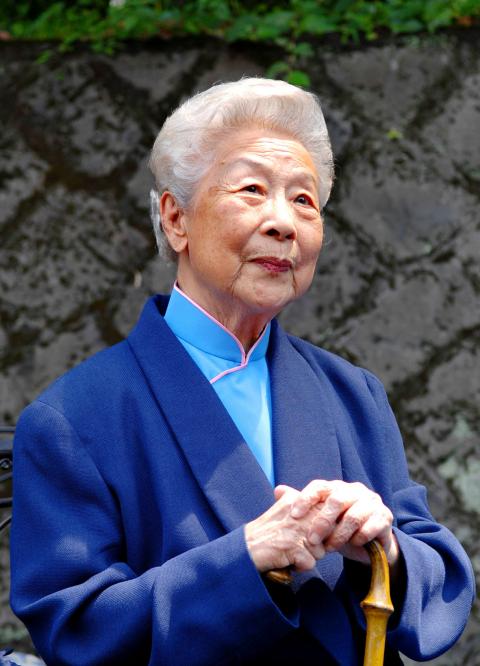
Photo: Lu Chun-wei, Taipei Times
“I had no idea it was going on. That was the last day to register, and I rushed to the registration office only to find out that it required documents that would likely take a whole day to prepare,” she says.
Fortunately, the registration staff allowed her to turn in the documents late. She was too busy to study, but luckily she already knew the material through years of practice.
On Jan. 17, 1951, Chuang became a licensed practitioner. People stopped calling her by her childhood nickname of “Shorty Chi” (矮仔旂) and started referring to her as “Lady Doctor” (查某先生). She also opened the Chingcheng Radiology Clinic (竟成放射線院) to help ease traffic at National Taiwan University hospital, which was often packed as the only institution in Taiwan to have radiology equipment.
FLIGHT TO JAPAN
Business was booming, but the good times wouldn’t last. Chuang’s clinic had a side business purchasing Angelica sinensis (當歸) from Hong Kong for the state-run Taiwan Tobacco and Wine Monopoly Bureau (菸酒公賣局) to produce medicinal wine. However, this violated the wartime and Martial Law era National General Mobilization Law (國家總動員法), which limited the amount of imports one could have to prevent hoarding.
Chuang was arrested by the military police, who held her for 20 days before informing her of her charges. Although she had the documents from the Tobacco and Wine Monopoly Bureau to prove her innocence, the military court sentenced her to three years anyway, causing a furious Chuang to collapse in court from an ulcer. She avoided jail time to treat her illness, but a military court official surnamed Lee (李) frequently blackmailed Chuang’s family for money, threatening to send her back to jail otherwise.
Chuang already had plans to head to Japan to study how to relieve the pain of terminal cancer patients, but now she had to flee Taiwan to avoid further trouble. With the help of a patient who happened to be the father-in-law of Chiang Wei-kuo (蔣緯國), then-president Chiang Kai-shek’s (蔣介石) adopted son, she obtained permission to treat her ulcer in Japan.
With her eldest daughter in tow, Chuang set off in May 1954. Meanwhile, Lee was arrested for blackmailing another woman in the same manner, and was sentenced to death. Chuang remained in Japan for the next three decades, earning her PhD in 1966 and becoming a Japanese household name for serving as medical consultant for Empress Michiko and later the entire imperial family.
Chuang finally returned to Taiwan in 1988, where she continued her work in cancer prevention and treatment. While she announced her retirement in 2009 at the age of 90, she still made a public appearance that year, leading more than 1,000 people in performing her signature exercises in front of Taipei City Hall.
Taiwan in Time, a column about Taiwan’s history that is published every Sunday, spotlights important or interesting events around the nation that have anniversaries this week.

Cheng Ching-hsiang (鄭青祥) turned a small triangle of concrete jammed between two old shops into a cool little bar called 9dimension. In front of the shop, a steampunk-like structure was welded by himself to serve as a booth where he prepares cocktails. “Yancheng used to be just old people,” he says, “but now young people are coming and creating the New Yancheng.” Around the corner, Yu Hsiu-jao (饒毓琇), opened Tiny Cafe. True to its name, it is the size of a cupboard and serves cold-brewed coffee. “Small shops are so special and have personality,” she says, “people come to Yancheng to find such treasures.” She

Late last month Philippines Foreign Affairs Secretary Theresa Lazaro told the Philippine Senate that the nation has sufficient funds to evacuate the nearly 170,000 Filipino residents in Taiwan, 84 percent of whom are migrant workers, in the event of war. Agencies have been exploring evacuation scenarios since early this year, she said. She also observed that since the Philippines has only limited ships, the government is consulting security agencies for alternatives. Filipinos are a distant third in overall migrant worker population. Indonesia has over 248,000 workers, followed by roughly 240,000 Vietnamese. It should be noted that there are another 170,000

Hannah Liao (廖宸萱) recalls the harassment she experienced on dating apps, an experience that left her frightened and disgusted. “I’ve tried some voice-based dating apps,” the 30-year-old says. “Right away, some guys would say things like, ‘Wanna talk dirty?’ or ‘Wanna suck my d**k?’” she says. Liao’s story is not unique. Ministry of Health and Welfare statistics show a more than 50 percent rise in sexual assault cases related to online encounters over the past five years. In 2023 alone, women comprised 7,698 of the 9,413 reported victims. Faced with a dating landscape that can feel more predatory than promising, many in
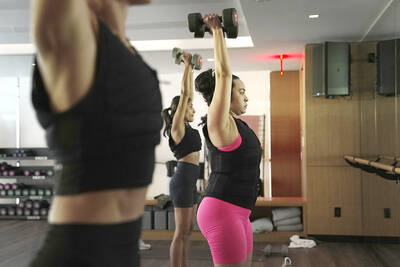
“This is one of those rare bits of TikTok fitness advice with a lot of truth behind it,” says Bethan Crouse, performance nutritionist at Loughborough University. “Sometimes it’s taken a bit too literally, though! You see people chugging protein drinks as they’re scanning out of their gym.” Crouse recommends the athletes she works with consume 20-30g of protein within 30-60 minutes of finishing a resistance training session. “The act of exercising our muscles increases the breakdown of muscle proteins,” she says. “In order to restore, or hopefully improve them — and get gains such as increased muscle mass or strength —